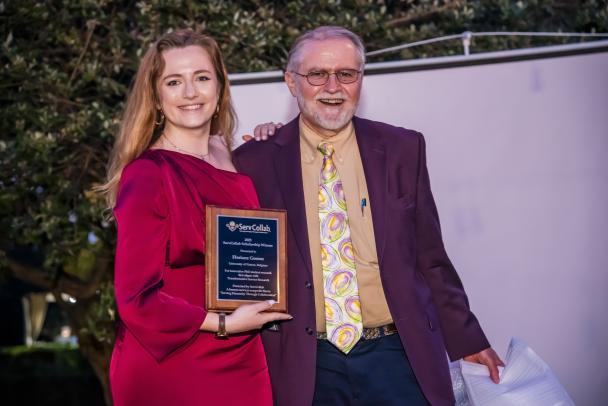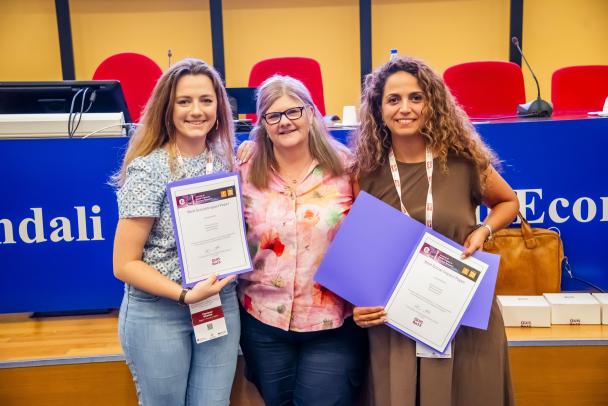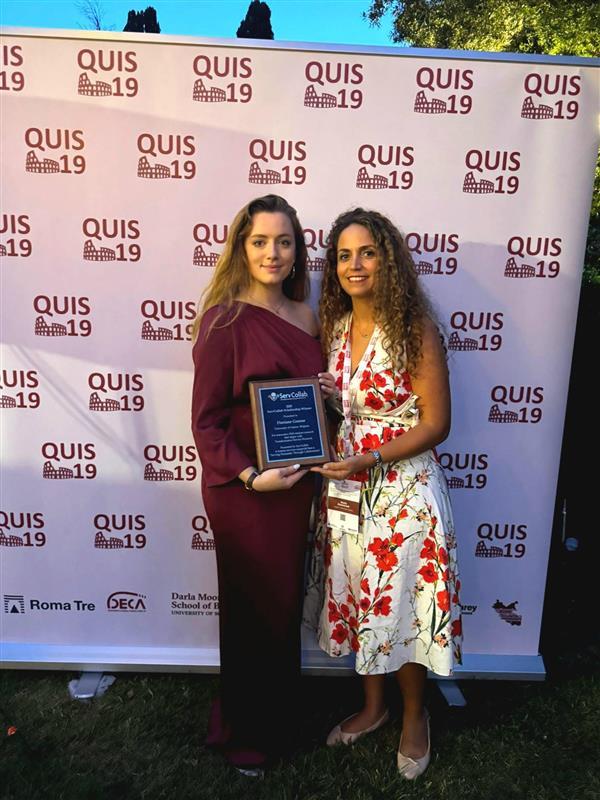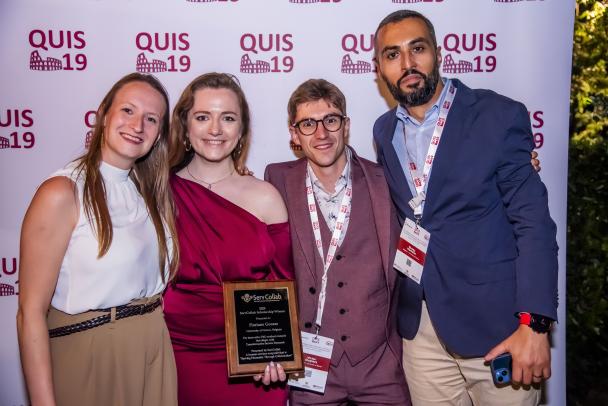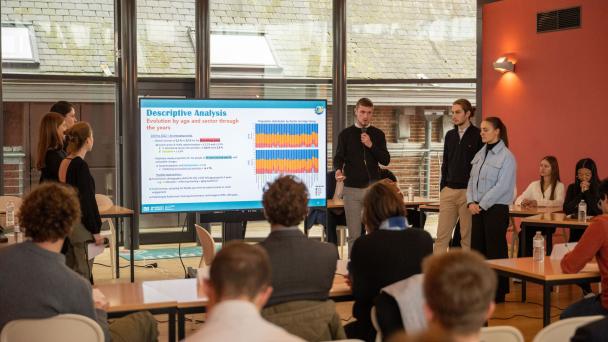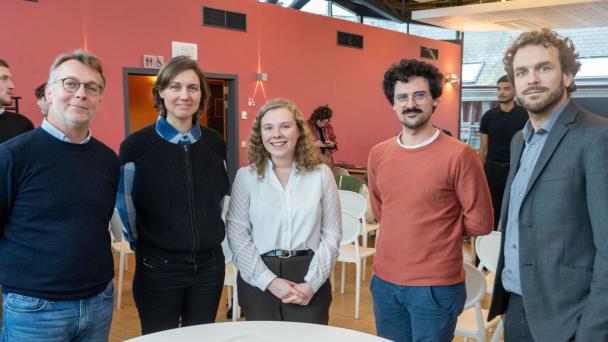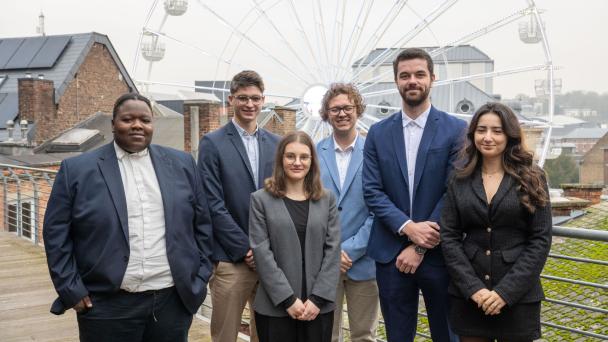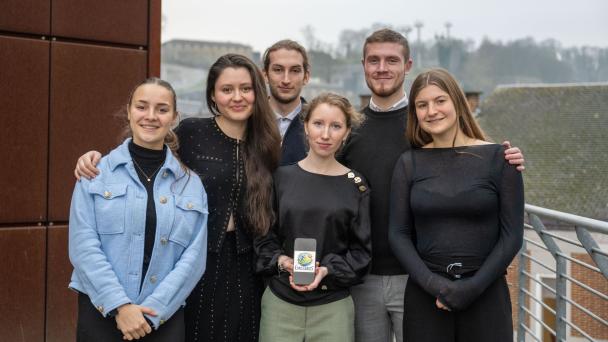Le Département des sciences du management remplit 3 missions principales : l’organisation des enseignements en gestion de premier (Bachelier), deuxième (Master) et troisième cycle (Doctorat), l’hébergement des activités de recherche de ses membres et le développement et l’entretien de liens avec le monde économique.
Présentation
Le Département regroupe les forces vives dans le domaine du management de l’UNamur. Il compte 16 académiques, 50 collaborateurs (experts issus d’autres institutions universitaires ou du monde économique), 9 assistants-chercheurs, 20 chercheurs ou post-docs et 4 membres du personnel administratif.
Afin de favoriser l’émergence en son sein de thématiques pouvant s’appuyer sur une masse critique, le Département a opté pour l’alignement des domaines d’enseignement et de recherche de ses membres. Cette approche facilite l’organisation des programmes de cours, le développement de projets de recherche ou encore l’encadrement des scientifiques. Ainsi, 4 grandes thématiques de cours, liées à celles des instituts et centres de recherche de l’université, sont identifiées :
- Digital and information management (NADI/MINDIT & FOCUS)
- Finance et méthodes quantitatives (DeFiPP/CeReFiM et naXys)
- Innovation, créativité et entrepreneuriat (NADI/CIRCé)
- Service and marketing management (NADI/CeRCLe)
Pour les enseignements nécessitant des compétences ne se retrouvant pas parmi ses membres, le Département s’appuie sur des experts extérieurs venant aussi bien du monde académique qu’économique.
Spotlight
News
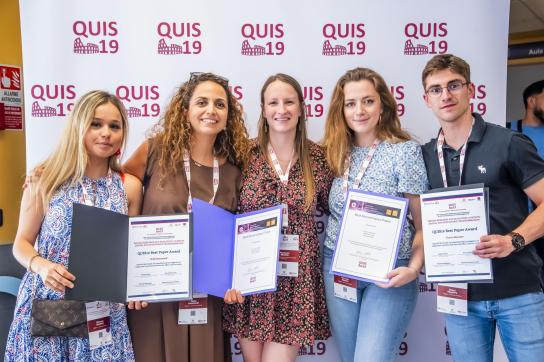
EMCP Faculty: three researchers receive awards - #1 Floriane Goosse receives double award for her research with societal impact
EMCP Faculty: three researchers receive awards - #1 Floriane Goosse receives double award for her research with societal impact
The NaDI-CeRCLe research center has distinguished itself brilliantly on the international scene in recent weeks. Three young researchers from the EMCP Faculty have received prestigious recognition at leading international events for their research in service management: they are Floriane Goosse, Victor Sluÿters and Florence Nizette. This summer, let's discover the work of these PhD students and their significant contributions to the advancement of knowledge and practice in this field.
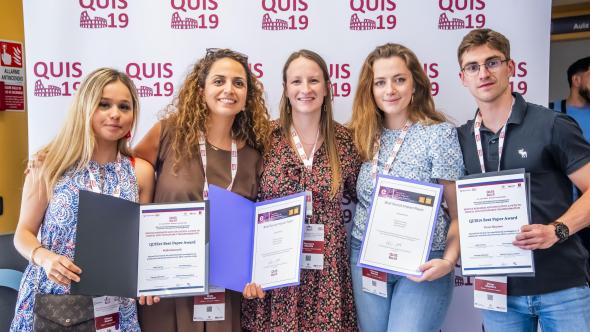
After winning the prestigious "Best Research Paper Award" at the SERVSIG conference by the American Marketing Association in 2024 for her thesis paper, Floriane Goosse, a researcher at the NaDI-CeRCLe research center, is among the two winners of the ServCollab Scholarship 2025, an international doctoral scholarship awarded by an American organization dedicated to promoting scientific research with high societal impact.
No fewer than 37 doctoral students from universities around the world were in the running to receive this scholarship. Two researchers were chosen after an in-depth selection process: Griffin Colaizzi, a PhD student in psychology at Northeastern University (USA), and Floriane Goosse, a PhD student at UNamur within NaDI-CeRCLE.
New technologies to empower people with disabilities
Supervised by Professors Wafa Hammedi (UNamur) and Dominik Mahr (Maastricht University), Floriane Goosse's thesis explores how new technologies, such as intelligent voice assistants, can empower people with disabilities, particularly the visually impaired, and thus significantly improve their well-being.
A high-potential project that convinced the members of the ServCollab jury, made up of eminent researchers in the field. The jury was particularly impressed by the young researcher's methodological rigor and praised her alignment with the principles of Transformative Service Research as well as her deep determination to create a tangible impact on the lives of so-called vulnerable people.
Triple recognition for Floriane Goosse
Floriane Goosse also took part in the 19th International Research Symposium on Service Excellence in Management (QUIS19), the bi-annual benchmark conference in service management, held in Rome in early June. On this occasion, his research once again distinguished itself by winning the prize for best research with societal impact, awarded by the conference's scientific committee. This prestigious international recognition crowns a rigorous and deeply committed body of work. Three major recognitions in less than a year, saluting both the scientific excellence and the strong societal impact of a particularly promising piece of research.
.
This recognition means a lot to me, and is a great encouragement for the continuation of my work, which I'm carrying out in collaboration with my co-sponsors, Professor Wafa Hammedi (NaDI-CeRCLE) and Professor Dominik Mahr (University of Maastricht). In my own small way, I'm delighted to be helping to change perspectives in the field of marketing, which is often focused on the corporate world, by putting research at the service of the community.
Find out more about NaDI-CeRCLe
The aim of the NaDI-CeRCLe Research Center is to actively promote theoretical and empirical research, both fundamental and applied, in the field of marketing and services, and more specifically in the areas of consumption and leisure.
.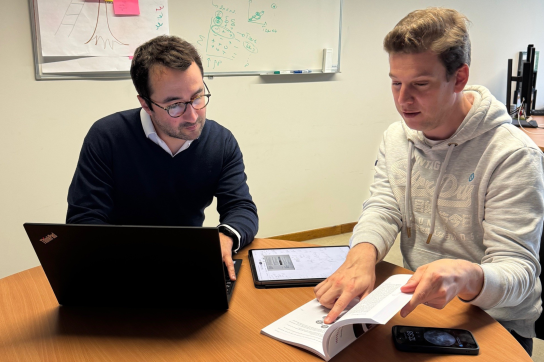
Motivation, leadership and AI: three levers to transform hospital practices
Motivation, leadership and AI: three levers to transform hospital practices
In a fast-changing hospital sector, with ever-increasing demands for performance and innovation, project management plays a key role. Kevin Lejeune, Program Manager at CHU UCL Namur, is tackling these challenges as part of a management thesis at the University of Namur, within the EMCP Faculty (Economics, Management, Communication and SciencesPo), under the supervision of Professor Corentin Burnay. His ambition: to understand and structure the human and technological dynamics shaping hospital governance, and propose concrete levers to support its transformation.
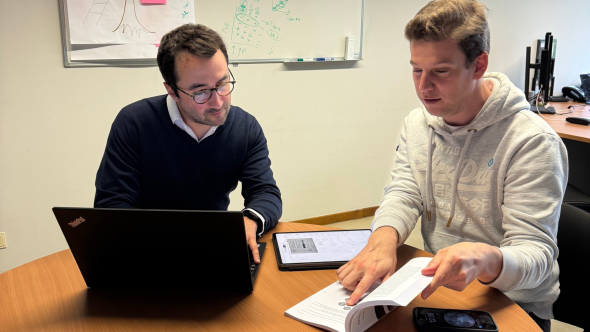
With its 5,000 employees, CHU UCL Namur is a unique field of study. A university hospital and the leading private employer in the province of Namur, it combines care, teaching and research missions, while facing the challenges of a constantly evolving organization. In this context, better structuring projects, reinforcing strategic steering and intelligently integrating technological innovation is becoming an imperative to guarantee the efficiency of processes and the sustainability of the reforms undertaken.
In contrast to other sectors, where projects are often entrusted to professionals trained in classic project management methodologies, hospitals rely mainly on non-professional project managers. These players, be they doctors, nurses, pharmacists, biologists, administrative staff, etc., regularly find themselves piloting strategic initiatives without dedicated project management training. Kevin Lejeune is interested in this reality, and seeks to understand how their intrinsic motivation and ability to structure initiatives in an informal setting influence the success of hospital projects. His doctoral thesis is part of a wider reflection on the balance between professionalization and organizational agility, supported by the academic expertise of UNamur.
While the sponsor is often presented as a key figure in projects, his role remains unclear and unevenly invested in reality. To what extent does his real involvement and interaction with the project manager influence the success of hospital initiatives? Drawing on the theory of leader-member exchange, Kevin Lejeune sets out to demonstrate that it's not so much the presence of the sponsor that matters, as the quality of his or her commitment. His work highlights three essential levers: the sponsor's concrete actions, his relational qualities and his level of involvement. This theoretical framework, nurtured by regular exchanges with the academic world of the EMCP Faculty, aims to provide tangible recommendations for rethinking leadership in hospital governance and better structuring the support of project managers.
The rise of artificial intelligence in healthcare opens up promising prospects, but also raises organizational and psychological resistance. How can we ensure that these tools do not remain isolated experiments, but become genuine catalysts for innovation within healthcare establishments? This is the issue that Kevin Lejeune explores in the final part of his research. He aims to identify the factors that influence the acceptance and integration of AI tools into hospital processes. Far from taking a purely technological approach, he focuses on the psychological and behavioral barriers that condition the adoption of these innovations. In particular, it analyzes the impact of perceived competence, self-esteem and professional recognition on the adoption of AI tools. By crossing hospital fieldwork and academic contributions, notably from UNamur, the aim is to propose implementation strategies adapted to the human dynamics specific to hospitals.
Through this thesis, Kevin Lejeune aims to offer hospitals operational keys to improve the management of their projects, structure the role of sponsors and support the adoption of technological innovations. Combining scientific rigor with a grounding in the field, his work is based on a dual approach: deciphering hospital organizational mechanisms to identify levers for improvement, and ensuring that these recommendations can be implemented pragmatically.
Beyond his research, he shares his expertise by leading project management training courses tailored to the hospital sector, and works with several institutions in Belgium and Benin. This involvement enables him to test the lessons learned from his research in real-life conditions, and to contribute to a sustainable transformation of healthcare organizations, in close collaboration with his scientific supervision at UNamur.
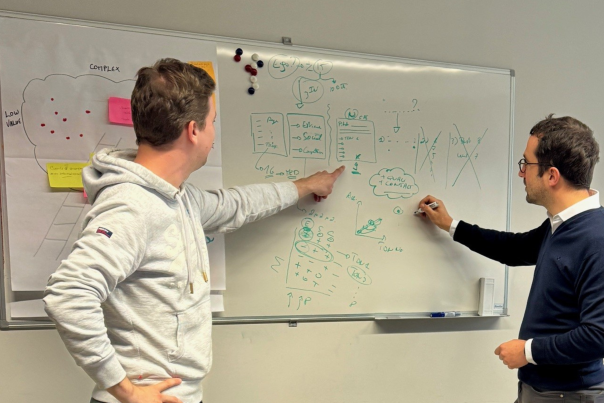
Discover Management studies :
Discover management research :
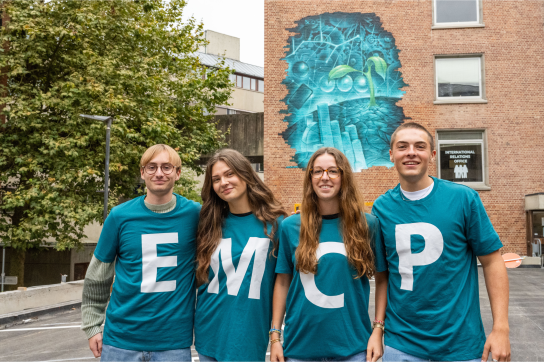
EMCP Faculty: Working together to transform
EMCP Faculty: Working together to transform
In September 1961, a few professors and fifteen students inaugurated the Faculty of Economic and Social Sciences at the University of Namur. Later renamed the Faculté des sciences économiques, sociales et de gestion, or FSESG, in over 60 years of existence, it has trained thousands of students who have become experts and decision-makers in key fields: economics, management, communication and political science. In September 2024, it changed its name to EMCP or Faculté Économie Management Communication sciencesPo. A change of name, symbol of a visionary mutation.
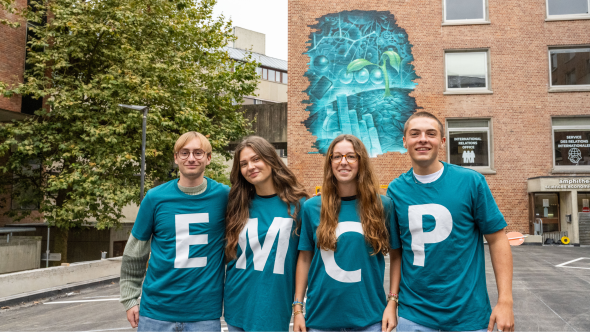
This article is taken from the "The day when" section of Omalius magazine for December 2024.
Four major teaching and research disciplines have marked the Faculty's development and become its pillars over the years: economics and political and social sciences first, then management and communication. "In its early days, the Faculty of Economic, Social and Management Sciences, created by Father Camille-Jean Joset, was united around social sciences and economics," recalls Pietro Zidda, Dean of the EMCP Faculty. "Then, the various fields developed. Management took off, enrolments in political science and communications soared. We were careful to maintain a spirit of collaboration between each of our programs". Far from the usual silos, the Faculty today makes it a point of honor for its chosen disciplines to collaborate, question and nurture each other in order to develop the skills of students and researchers so that together they can contribute to the challenges of a society in transition.
Three key missions
The EMCP Faculty is committed to three major missions. The first is to train responsible experts and decision-makers, through rigorous, hands-on teaching that stimulates critical thinking and openness to the world. It also aims to conduct ambitious, interdisciplinary research with a strong scientific impact, feeding into teaching and innovation. Finally, the EMCP Faculty wishes to act as a responsible player in societal development, sharing knowledge and contributing to informed decisions at regional, national and international levels.
It is therefore quite natural that the FSESG has become the EMCP Faculty, a name now incorporating communication and political sciences and reflecting the importance they have acquired in recent years. Four disciplines united to prepare students and researchers in a transdisciplinary way for the challenges of tomorrow.
Collaboration, transdisciplinarity and unity
The spirit of collaboration is firmly rooted at the heart of the Faculty, which strives to develop transdisciplinary approaches to meet the complex challenges of a society in transition. "To meet these challenges, a solution from a single discipline is no longer enough. We need to think more broadly, with an approach that transcends disciplines," explains Anne-Sophie Collard, Vice-Dean of the EMCP Faculty. A sentiment shared by Zora Gilet, a management engineering student: "This new name above all brings coherence to the Faculty's image and visibility for all the courses on offer. It also represents the intra-faculty diversity that we wish to promote at all levels."
This vision is also accompanied by an internal reorganization, with the creation of four thematic schools or schools: UNamur School of Economics (NSE), UNamur School of Management (UNSM), UNamur School of Social Sciences, Politics and Communication and UNamur School of Evening Studies in Economics and Management. These schools aim to strengthen synergy between disciplines, while promoting a pedagogy that integrates cross-disciplinary skills and innovative working methods. Soft skills, for example, are now systematically integrated into projects, to prepare students to respond to societal challenges in a collaborative and creative way. "I think this change helps to concretize and recognize all the large-scale projects that have been set up in recent years," explains Zora. It's an expression of a desire to develop and innovate, which is more than positive today. I consider myself lucky to be able to witness this change and proud to be part of this community."
"EMCP aims to be the catalyst lever for a future where walls are broken down and barriers between disciplines abolished as much as possible, to provide strong solutions to societal problems," concludes Pietro Zidda. This new name therefore goes beyond mere naming: it symbolizes a renewed commitment to transforming the way graduates are trained, giving them the tools they need to provide strong, coherent solutions to major contemporary challenges.
Innovative and conclusive teaching experiments
Within the Faculty, various projects and teaching experiments illustrate this EMCP vision. Examples?
Learning by doing: an approach that offers immersion in concrete projects from the first year, combining knowledge and cross-disciplinary skills to respond to real-life challenges.
Regards croisés: this project invites students and teachers to explore a topical issue from a variety of disciplinary angles, enriched by exchanges with experts in the field at a major final conference.
Dialogue between a dean and ChatGPT
To mark the name change, a fresco was erected on one of the Faculty's facades. The result? A work in shades of blue and green, where the four letters of the faculty are concealed. A young shoot evokes hope and sustainability, patterns of connections symbolize the interactions and complementarities between the various disciplines, a pendulum embodies the balance sought between them...

A little wink, the Dean of Faculty wondered how this fresco would be perceived by an outside audience: "This work is quite original compared to what we usually do. So I asked the artificial intelligence to give me its interpretation. And then, surprise, the answer was bluffing! ChatGPT perfectly identified the meaning and intentions of the project, as if it had read our initial brief", laughs the dean.
The EMCP Circle: students involved in change
Students have also been involved in this transformation, notably through their circles. Thus, the Cercle €co became the Cercle EMCP. "We were contacted by the Dean, who suggested that our Circle should bear the same name as the Faculty, and this seemed to us to be a perfectly natural move. We had many discussions with the dean and the vice-presidents of the Cercle. We put a lot of effort into the name change, but it was an extremely rewarding experience," explains Matthieu Dupuis, President of the Cercle EMCP. "The change may have come as a surprise to some students, but this new name enriches the Faculty's image by enhancing the value of all its courses of study. It embodies strong values and, in my opinion, represents our Faculty better than the old one."
This article is taken from the "The day when" section of Omalius magazine #35 (December 2024).
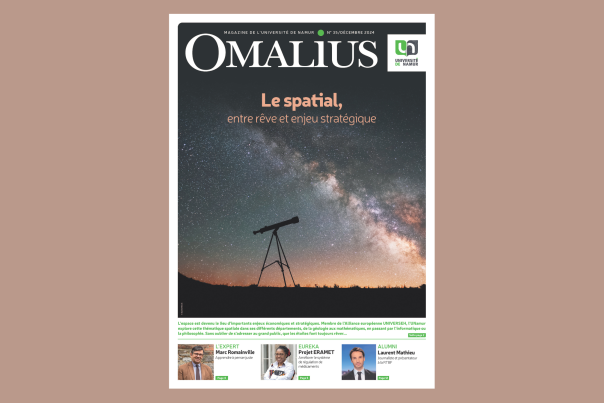
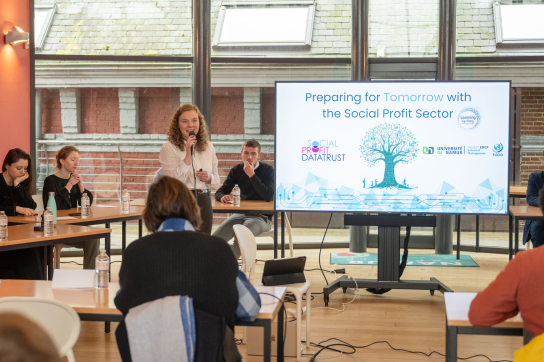
Training for action: data analysis for the social sector
Training for action: data analysis for the social sector
How can data analysis contribute to sustainable development and the social profit sector? This is the challenge answered by students in the Bachelor of Management Engineering program at the Faculty of Economics Management Communication sciencesPo (EMCP) at the University of Namur. On December 12, 2024, they presented their projects at the Namur Stock Exchange, after three months' work on data analyses carried out in collaboration with partners in the social profit sector. They explored themes essential to this sector and our society, as part of the "Data Analytics" course, taught by Claire Deventer in partnership with the King Baudouin Foundation and leading representatives of the social profit sector in Belgium.
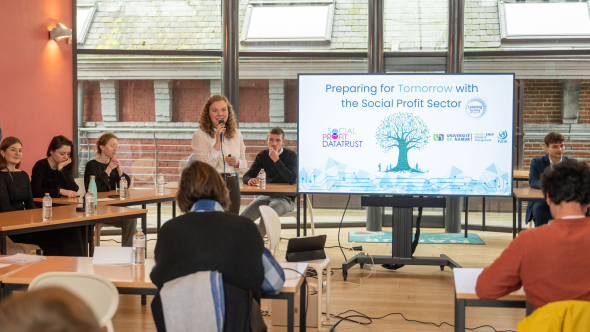
The Data Analytics course is an applied course implementing a pedagogy inspired by Service Learning and Learning by Doing. Divided into different teams, the students explored important challenges for the social profit sector and the sustainable development of our society, such as the care offered to the elderly or the match between the training offer and the work sector. These analyses were based, among other things, on data from the Social Profit Data Trust, a platform created by the King Baudouin Foundation in collaboration with representatives of the social profit sector: UNIPSO, Verso, Unisoc, BRUXEO and ConcertES. An immersive setting that enabled students to develop their data analysis skills while reflecting on the positive impacts that their talents in this practice could bring to society.
"The aim of this assignment is to enable students to put themselves in the shoes of real data analysts: analyzing data, proposing concrete solutions and communicating their results in a clear and impactful way, explains Claire Deventer, teacher of the course. "More than technical skills, data analysis also requires managerial, human and ethical skills. Students were coached to think about the impact their data analysis could have on society, and ways of making it as ethical as possible."
Inspired by the Service Learning philosophy where students learn by putting their skills at the service of society, the project spearheaded by Claire Deventer benefited from invaluable pedagogical support from Maxime Giegas, specialist in education for global citizenship and solidarity at the FUCID, Charlotte Sine, technopedagogue at the Faculty of Education and Training Sciences (FaSEF) as well as Benito Giunta, assistant at the Faculty EMCP.
Themes rooted in reality
The students explored three key themes for the social profit sector: an aging society, the changing labor market and the development of the social profit sector.
"Beyond the statistics, there's a human reality, stresses Mathieu de Poorter, economic advisor at UNIPSO and project partner. "As partners in the project, we wanted to see how students, sometimes far removed from our themes, could bring a fresh perspective and make relevant recommendations."
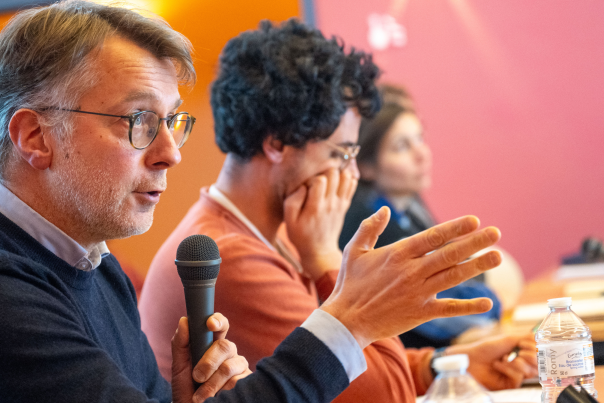
On December 12, 2024, after nearly three months of reflection and work on their theme, the students were able to deliver their analyses and best proposals for solutions. It was at the Namur Stock Exchange that the six student teams presented their work to the project partners, present to debate these important themes:
- Tine Holvoet, policy advisor, entrepreneurship and innovation at Verso Mathieu de Poorter, economic advisor at UnipsoQuentin Pivont, economic advisor at Unipso
- Emilien Leurquin, economic advisor at Unisoc
By highlighting concrete solutions for the social profit sector, this project illustrates how data analytics skills can contribute to and respond to societal and sustainability issues. "Seeing engineering students take an interest in social economy issues is not only inspiring, but essential for building bridges between the academic and professional worlds," enthuses Quentin Pivont.
"The aim of the project was to analyze data to produce a study, a model and come up with concrete solutions", explain Tanguy and Lénaïc, students in management engineering. "We were very challenged, but the teachers supervised us very well." For Ambre and Inès, also management engineering students, this project was a revelation: "This work enabled us to combine our knowledge of programming and analysis with direct feedback from professionals. It enabled us to refine our interests and better define what we like to do. It was a fairly substantial piece of work, but we're really proud of what we're going to propose."
Education for the common good
This innovative pedagogical project demonstrates how data analysis can be a powerful lever for tackling societal challenges and promoting sustainable development. By collaborating with key players in the social profit sector, students not only developed technical and managerial skills, but also became aware of the importance of their role as committed future professionals. This type of initiative perfectly illustrates the University's potential to connect academic knowledge, societal needs and concrete innovations to build a more equitable and sustainable future.

EMCP Faculty: three researchers receive awards - #1 Floriane Goosse receives double award for her research with societal impact
EMCP Faculty: three researchers receive awards - #1 Floriane Goosse receives double award for her research with societal impact
The NaDI-CeRCLe research center has distinguished itself brilliantly on the international scene in recent weeks. Three young researchers from the EMCP Faculty have received prestigious recognition at leading international events for their research in service management: they are Floriane Goosse, Victor Sluÿters and Florence Nizette. This summer, let's discover the work of these PhD students and their significant contributions to the advancement of knowledge and practice in this field.

After winning the prestigious "Best Research Paper Award" at the SERVSIG conference by the American Marketing Association in 2024 for her thesis paper, Floriane Goosse, a researcher at the NaDI-CeRCLe research center, is among the two winners of the ServCollab Scholarship 2025, an international doctoral scholarship awarded by an American organization dedicated to promoting scientific research with high societal impact.
No fewer than 37 doctoral students from universities around the world were in the running to receive this scholarship. Two researchers were chosen after an in-depth selection process: Griffin Colaizzi, a PhD student in psychology at Northeastern University (USA), and Floriane Goosse, a PhD student at UNamur within NaDI-CeRCLE.
New technologies to empower people with disabilities
Supervised by Professors Wafa Hammedi (UNamur) and Dominik Mahr (Maastricht University), Floriane Goosse's thesis explores how new technologies, such as intelligent voice assistants, can empower people with disabilities, particularly the visually impaired, and thus significantly improve their well-being.
A high-potential project that convinced the members of the ServCollab jury, made up of eminent researchers in the field. The jury was particularly impressed by the young researcher's methodological rigor and praised her alignment with the principles of Transformative Service Research as well as her deep determination to create a tangible impact on the lives of so-called vulnerable people.
Triple recognition for Floriane Goosse
Floriane Goosse also took part in the 19th International Research Symposium on Service Excellence in Management (QUIS19), the bi-annual benchmark conference in service management, held in Rome in early June. On this occasion, his research once again distinguished itself by winning the prize for best research with societal impact, awarded by the conference's scientific committee. This prestigious international recognition crowns a rigorous and deeply committed body of work. Three major recognitions in less than a year, saluting both the scientific excellence and the strong societal impact of a particularly promising piece of research.
.
This recognition means a lot to me, and is a great encouragement for the continuation of my work, which I'm carrying out in collaboration with my co-sponsors, Professor Wafa Hammedi (NaDI-CeRCLE) and Professor Dominik Mahr (University of Maastricht). In my own small way, I'm delighted to be helping to change perspectives in the field of marketing, which is often focused on the corporate world, by putting research at the service of the community.
Find out more about NaDI-CeRCLe
The aim of the NaDI-CeRCLe Research Center is to actively promote theoretical and empirical research, both fundamental and applied, in the field of marketing and services, and more specifically in the areas of consumption and leisure.
.
Motivation, leadership and AI: three levers to transform hospital practices
Motivation, leadership and AI: three levers to transform hospital practices
In a fast-changing hospital sector, with ever-increasing demands for performance and innovation, project management plays a key role. Kevin Lejeune, Program Manager at CHU UCL Namur, is tackling these challenges as part of a management thesis at the University of Namur, within the EMCP Faculty (Economics, Management, Communication and SciencesPo), under the supervision of Professor Corentin Burnay. His ambition: to understand and structure the human and technological dynamics shaping hospital governance, and propose concrete levers to support its transformation.

With its 5,000 employees, CHU UCL Namur is a unique field of study. A university hospital and the leading private employer in the province of Namur, it combines care, teaching and research missions, while facing the challenges of a constantly evolving organization. In this context, better structuring projects, reinforcing strategic steering and intelligently integrating technological innovation is becoming an imperative to guarantee the efficiency of processes and the sustainability of the reforms undertaken.
In contrast to other sectors, where projects are often entrusted to professionals trained in classic project management methodologies, hospitals rely mainly on non-professional project managers. These players, be they doctors, nurses, pharmacists, biologists, administrative staff, etc., regularly find themselves piloting strategic initiatives without dedicated project management training. Kevin Lejeune is interested in this reality, and seeks to understand how their intrinsic motivation and ability to structure initiatives in an informal setting influence the success of hospital projects. His doctoral thesis is part of a wider reflection on the balance between professionalization and organizational agility, supported by the academic expertise of UNamur.
While the sponsor is often presented as a key figure in projects, his role remains unclear and unevenly invested in reality. To what extent does his real involvement and interaction with the project manager influence the success of hospital initiatives? Drawing on the theory of leader-member exchange, Kevin Lejeune sets out to demonstrate that it's not so much the presence of the sponsor that matters, as the quality of his or her commitment. His work highlights three essential levers: the sponsor's concrete actions, his relational qualities and his level of involvement. This theoretical framework, nurtured by regular exchanges with the academic world of the EMCP Faculty, aims to provide tangible recommendations for rethinking leadership in hospital governance and better structuring the support of project managers.
The rise of artificial intelligence in healthcare opens up promising prospects, but also raises organizational and psychological resistance. How can we ensure that these tools do not remain isolated experiments, but become genuine catalysts for innovation within healthcare establishments? This is the issue that Kevin Lejeune explores in the final part of his research. He aims to identify the factors that influence the acceptance and integration of AI tools into hospital processes. Far from taking a purely technological approach, he focuses on the psychological and behavioral barriers that condition the adoption of these innovations. In particular, it analyzes the impact of perceived competence, self-esteem and professional recognition on the adoption of AI tools. By crossing hospital fieldwork and academic contributions, notably from UNamur, the aim is to propose implementation strategies adapted to the human dynamics specific to hospitals.
Through this thesis, Kevin Lejeune aims to offer hospitals operational keys to improve the management of their projects, structure the role of sponsors and support the adoption of technological innovations. Combining scientific rigor with a grounding in the field, his work is based on a dual approach: deciphering hospital organizational mechanisms to identify levers for improvement, and ensuring that these recommendations can be implemented pragmatically.
Beyond his research, he shares his expertise by leading project management training courses tailored to the hospital sector, and works with several institutions in Belgium and Benin. This involvement enables him to test the lessons learned from his research in real-life conditions, and to contribute to a sustainable transformation of healthcare organizations, in close collaboration with his scientific supervision at UNamur.

Discover Management studies :
Discover management research :

EMCP Faculty: Working together to transform
EMCP Faculty: Working together to transform
In September 1961, a few professors and fifteen students inaugurated the Faculty of Economic and Social Sciences at the University of Namur. Later renamed the Faculté des sciences économiques, sociales et de gestion, or FSESG, in over 60 years of existence, it has trained thousands of students who have become experts and decision-makers in key fields: economics, management, communication and political science. In September 2024, it changed its name to EMCP or Faculté Économie Management Communication sciencesPo. A change of name, symbol of a visionary mutation.

This article is taken from the "The day when" section of Omalius magazine for December 2024.
Four major teaching and research disciplines have marked the Faculty's development and become its pillars over the years: economics and political and social sciences first, then management and communication. "In its early days, the Faculty of Economic, Social and Management Sciences, created by Father Camille-Jean Joset, was united around social sciences and economics," recalls Pietro Zidda, Dean of the EMCP Faculty. "Then, the various fields developed. Management took off, enrolments in political science and communications soared. We were careful to maintain a spirit of collaboration between each of our programs". Far from the usual silos, the Faculty today makes it a point of honor for its chosen disciplines to collaborate, question and nurture each other in order to develop the skills of students and researchers so that together they can contribute to the challenges of a society in transition.
Three key missions
The EMCP Faculty is committed to three major missions. The first is to train responsible experts and decision-makers, through rigorous, hands-on teaching that stimulates critical thinking and openness to the world. It also aims to conduct ambitious, interdisciplinary research with a strong scientific impact, feeding into teaching and innovation. Finally, the EMCP Faculty wishes to act as a responsible player in societal development, sharing knowledge and contributing to informed decisions at regional, national and international levels.
It is therefore quite natural that the FSESG has become the EMCP Faculty, a name now incorporating communication and political sciences and reflecting the importance they have acquired in recent years. Four disciplines united to prepare students and researchers in a transdisciplinary way for the challenges of tomorrow.
Collaboration, transdisciplinarity and unity
The spirit of collaboration is firmly rooted at the heart of the Faculty, which strives to develop transdisciplinary approaches to meet the complex challenges of a society in transition. "To meet these challenges, a solution from a single discipline is no longer enough. We need to think more broadly, with an approach that transcends disciplines," explains Anne-Sophie Collard, Vice-Dean of the EMCP Faculty. A sentiment shared by Zora Gilet, a management engineering student: "This new name above all brings coherence to the Faculty's image and visibility for all the courses on offer. It also represents the intra-faculty diversity that we wish to promote at all levels."
This vision is also accompanied by an internal reorganization, with the creation of four thematic schools or schools: UNamur School of Economics (NSE), UNamur School of Management (UNSM), UNamur School of Social Sciences, Politics and Communication and UNamur School of Evening Studies in Economics and Management. These schools aim to strengthen synergy between disciplines, while promoting a pedagogy that integrates cross-disciplinary skills and innovative working methods. Soft skills, for example, are now systematically integrated into projects, to prepare students to respond to societal challenges in a collaborative and creative way. "I think this change helps to concretize and recognize all the large-scale projects that have been set up in recent years," explains Zora. It's an expression of a desire to develop and innovate, which is more than positive today. I consider myself lucky to be able to witness this change and proud to be part of this community."
"EMCP aims to be the catalyst lever for a future where walls are broken down and barriers between disciplines abolished as much as possible, to provide strong solutions to societal problems," concludes Pietro Zidda. This new name therefore goes beyond mere naming: it symbolizes a renewed commitment to transforming the way graduates are trained, giving them the tools they need to provide strong, coherent solutions to major contemporary challenges.
Innovative and conclusive teaching experiments
Within the Faculty, various projects and teaching experiments illustrate this EMCP vision. Examples?
Learning by doing: an approach that offers immersion in concrete projects from the first year, combining knowledge and cross-disciplinary skills to respond to real-life challenges.
Regards croisés: this project invites students and teachers to explore a topical issue from a variety of disciplinary angles, enriched by exchanges with experts in the field at a major final conference.
Dialogue between a dean and ChatGPT
To mark the name change, a fresco was erected on one of the Faculty's facades. The result? A work in shades of blue and green, where the four letters of the faculty are concealed. A young shoot evokes hope and sustainability, patterns of connections symbolize the interactions and complementarities between the various disciplines, a pendulum embodies the balance sought between them...

A little wink, the Dean of Faculty wondered how this fresco would be perceived by an outside audience: "This work is quite original compared to what we usually do. So I asked the artificial intelligence to give me its interpretation. And then, surprise, the answer was bluffing! ChatGPT perfectly identified the meaning and intentions of the project, as if it had read our initial brief", laughs the dean.
The EMCP Circle: students involved in change
Students have also been involved in this transformation, notably through their circles. Thus, the Cercle €co became the Cercle EMCP. "We were contacted by the Dean, who suggested that our Circle should bear the same name as the Faculty, and this seemed to us to be a perfectly natural move. We had many discussions with the dean and the vice-presidents of the Cercle. We put a lot of effort into the name change, but it was an extremely rewarding experience," explains Matthieu Dupuis, President of the Cercle EMCP. "The change may have come as a surprise to some students, but this new name enriches the Faculty's image by enhancing the value of all its courses of study. It embodies strong values and, in my opinion, represents our Faculty better than the old one."
This article is taken from the "The day when" section of Omalius magazine #35 (December 2024).


Training for action: data analysis for the social sector
Training for action: data analysis for the social sector
How can data analysis contribute to sustainable development and the social profit sector? This is the challenge answered by students in the Bachelor of Management Engineering program at the Faculty of Economics Management Communication sciencesPo (EMCP) at the University of Namur. On December 12, 2024, they presented their projects at the Namur Stock Exchange, after three months' work on data analyses carried out in collaboration with partners in the social profit sector. They explored themes essential to this sector and our society, as part of the "Data Analytics" course, taught by Claire Deventer in partnership with the King Baudouin Foundation and leading representatives of the social profit sector in Belgium.

The Data Analytics course is an applied course implementing a pedagogy inspired by Service Learning and Learning by Doing. Divided into different teams, the students explored important challenges for the social profit sector and the sustainable development of our society, such as the care offered to the elderly or the match between the training offer and the work sector. These analyses were based, among other things, on data from the Social Profit Data Trust, a platform created by the King Baudouin Foundation in collaboration with representatives of the social profit sector: UNIPSO, Verso, Unisoc, BRUXEO and ConcertES. An immersive setting that enabled students to develop their data analysis skills while reflecting on the positive impacts that their talents in this practice could bring to society.
"The aim of this assignment is to enable students to put themselves in the shoes of real data analysts: analyzing data, proposing concrete solutions and communicating their results in a clear and impactful way, explains Claire Deventer, teacher of the course. "More than technical skills, data analysis also requires managerial, human and ethical skills. Students were coached to think about the impact their data analysis could have on society, and ways of making it as ethical as possible."
Inspired by the Service Learning philosophy where students learn by putting their skills at the service of society, the project spearheaded by Claire Deventer benefited from invaluable pedagogical support from Maxime Giegas, specialist in education for global citizenship and solidarity at the FUCID, Charlotte Sine, technopedagogue at the Faculty of Education and Training Sciences (FaSEF) as well as Benito Giunta, assistant at the Faculty EMCP.
Themes rooted in reality
The students explored three key themes for the social profit sector: an aging society, the changing labor market and the development of the social profit sector.
"Beyond the statistics, there's a human reality, stresses Mathieu de Poorter, economic advisor at UNIPSO and project partner. "As partners in the project, we wanted to see how students, sometimes far removed from our themes, could bring a fresh perspective and make relevant recommendations."

On December 12, 2024, after nearly three months of reflection and work on their theme, the students were able to deliver their analyses and best proposals for solutions. It was at the Namur Stock Exchange that the six student teams presented their work to the project partners, present to debate these important themes:
- Tine Holvoet, policy advisor, entrepreneurship and innovation at Verso Mathieu de Poorter, economic advisor at UnipsoQuentin Pivont, economic advisor at Unipso
- Emilien Leurquin, economic advisor at Unisoc
By highlighting concrete solutions for the social profit sector, this project illustrates how data analytics skills can contribute to and respond to societal and sustainability issues. "Seeing engineering students take an interest in social economy issues is not only inspiring, but essential for building bridges between the academic and professional worlds," enthuses Quentin Pivont.
"The aim of the project was to analyze data to produce a study, a model and come up with concrete solutions", explain Tanguy and Lénaïc, students in management engineering. "We were very challenged, but the teachers supervised us very well." For Ambre and Inès, also management engineering students, this project was a revelation: "This work enabled us to combine our knowledge of programming and analysis with direct feedback from professionals. It enabled us to refine our interests and better define what we like to do. It was a fairly substantial piece of work, but we're really proud of what we're going to propose."
Education for the common good
This innovative pedagogical project demonstrates how data analysis can be a powerful lever for tackling societal challenges and promoting sustainable development. By collaborating with key players in the social profit sector, students not only developed technical and managerial skills, but also became aware of the importance of their role as committed future professionals. This type of initiative perfectly illustrates the University's potential to connect academic knowledge, societal needs and concrete innovations to build a more equitable and sustainable future.
Agenda
Preparatory courses
Top start for a revision period

A program for every discipline
During late August and early September, UNamur offers rheto students preparatory courses tailored to their future training.
These revision sessions are specially designed to support students in their transition to university. By reinforcing their foundations in the key subjects of their future discipline, they enable them to approach their first year with confidence.
These preparatory courses are also an excellent opportunity to discover the campus, meet future classmates and familiarize themselves with the learning methods specific to higher education.
Preparation for the medical entrance exam
For students wishing to begin studying medicine, two sessions are also organized according to a specific timetable to prepare for the entrance exam.
Academic year 2025-2026
Something for everyone
09:30 | Welcome ceremony for new students
11:00 | Back-to-school celebration at Saint-Aubain Cathedral (Place Saint-Aubain - 5000 Namur), followed by student welcome by the Cercles.
Official ceremony for the start of the academic year 2025-2026
Save the date!



